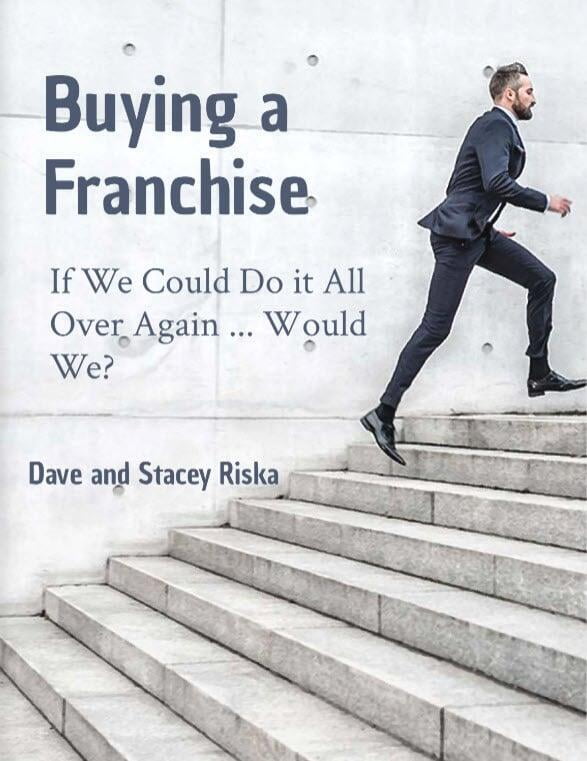
So we are going on another rant. A lot of times when we talk to people about franchises, they get very defensive about having to pay quote-unquote franchise fees or royalties. What we want to discuss today is why these fees are very important to what you are acquiring (when buying a franchise), and in most cases you'll find these fees are a good thing, not a bad thing, when you acquire a good franchise. We’ll start off by laying out what are some of the types of franchise fees, and discuss a little bit about each one of them, what they mean to a franchisee, what the franchise is getting for them and why they can be a good thing, not a bad thing.
Let's start with a little education because those F-word fees can actually be a good thing. First, you will need to understand what they are, and in each franchise, there are a few of them you want to pay attention to. There's the franchise fee, there are royalties, there might be an ad fee, there might be technology fees, training fees, and marketing fees. It may seem so overwhelming, but if you were to go out and start your own business, you're going to have these exact same fees (costs) in any business. It's just a cost of doing business. So let's break down these fees and understand what they are and how the franchise uses them.
The Franchise Fee
The franchise fee is the fee that you pay when you acquire the franchise. That's your upfront investment to have rights to use that franchise's name, branding and intellectual property and systems.
It's like your golden ticket, your entry ticket to get the rights to the name, the logo, all of that. So you might be asking right now what does a franchise fee cost?
Well, first off, the franchise fee is not a cost, it's an investment. You are investing in that franchise and typically it's all over the place. We’ve seen it as low as a few thousand dollars and as high as let's just say a hundred thousand dollars, even though it's anywhere in between there.
The average that we see with the good franchises we work with is usually $40,000 to $50,000. It's a one-time fee. Again, think of it as your entry ticket to get the rights to that proprietary system and to use the branding, the logo, and get yourself up into business.
Royalties
We generally hear the most backlash about this one. I don't want to pay a royalty.
So what is a royalty and what should you know about it? A royalty is an ongoing fee that you will have to pay once you are up and operating in your franchise. It’s generally a percentage typically of sales, sometimes it's 4%, and sometimes for some franchises, it's as much as 10%. It really comes down to a couple of things.
Number one, not all franchises are created equal. You may pay this, and unfortunately, you may or may not get your money's worth for what you're putting into it. A good, well run, franchise that royalty is put into the business to help you. It's really there to provide the infrastructure for you to collaborate with other folks that are in the system. Also, it is used to help you with purchasing power, meaning that you're collaboratively purchasing things with other franchisees where the franchisor will get a negotiated discount for everybody. In many cases, those discounts can actually pay for the investment in the ongoing royalty.
Here’s a little bit of a different take on the royalty. Think of this as a mindset shift. So when you, as a customer, a consumer, you go out and you buy something at the grocery store, you get your oil changed, you get your pet groomed, buy pet food, whatever it is. Do you ever sit and analyze the price thinking, hmm, I wonder how much of that goes to profit? I wonder how much is really going into that business's pocket? No, you just, you buy it.
When you own a business, there are the things that you buy to run, operate your business and to grow it. Let's say you're a restaurant owner, you're buying food. Do you sit there and analyze and wonder, hmm, I wonder how much profit that business is making off of that? No, you hopefully want that business to make a profit because they won't stay in business if they don't.
So think about this… the royalty is money that goes to the franchisor. This is how they make their money .. and that's just the bottom line.
They really don't make money on the franchise fee. That's the cost of bringing you in, getting you set up and trained. They make their ongoing money from that royalty. Wouldn't you want your franchise to make money so they can stay profitable and operational? There are extra benefits like purchasing power and bringing people together into a community. So is it a horrible thing that a franchise makes 5%? I bet there's a lot more profit in other products and services that you're buying over the shelf or at your car shop or all these examples that I gave to you. You just don't see it because it's built into the cost. So build that extra 5% into your business and prices and cover those royalties. Think of it as a mindset shift as we said earlier.
So in general, royalties probably across most franchises we work with they're about 5%. It's not really a big deal, and it's going to help your franchise stay profitable. In return in a good franchise, they're using that to reinvest to help all franchisees.
Advertising Fee
An advertising fee (or marketing fees) are really a community bucket where all the franchisees put money into this bucket for the franchisor to provide some level of advertising support for the franchisees. These, range from 1 to 3%.
It's one of those things where it's the same concept to me as a royalty in that they're going out and doing advertising and finding advertising opportunities for you as a franchisee that you may or may not even be able to get on your own. Lots of advertising opportunities are locked out to only larger corporations and companies, but when a larger or a good franchise approaches them with a hundred units, all of a sudden their ears perk up and they may be more willing to allow them to do some advertising that you couldn't possibly do on your own.
So, in general, the ad fee is more nationally based creating awareness and recognition for the brand. Now, some franchises may have an additional fee for co-op or local marketing and advertising fees.
The co-op or local marketing fees, a lot of times, are voluntary, meaning that they highly encourage those that are in a locality that has multiple locations in that locality to basically co-op some funds to do some local for more local types of advertising at that area level, but it’s not mandatory. For some of them, you are required to put in a certain amount, sometimes it's just a dollar amount, $250 a month, 300, 500 a month, and that goes into a bucket and then has to be spent on local advertising.
You probably don't realize it as a consumer, but a lot of these larger franchise chains like quick-serve restaurants or automotive services have co-ops. So all of their local or regional franchisees put money into a pot and they do advertising. So when you hear an ad on the radio or you see something digitally on your computer or something on tv, those are most likely your co-op dollars. They may be running a special just in your area, but in another area of the country, that same ad wouldn't be running because it's more local or regionally oriented. That's the point of a co-op. You can take advantage of local or regional opportunities or events or holidays that may be happening.
Technology and Other Services Fees
We talked a little bit about advertising and marketing now we'll talk about technology and we'll call them service fees because it's not just technology. There are call center fees. Some of the franchises we work with offer accounting support, meaning that they do all your books and stuff for you on a turnkey level.
Those are the types of franchises where the owner isn't going to so likely be an owner-operator per se. Maybe they want to be more hands-off and have a more turnkey system for them for some of the things they would have to do on an ongoing basis. For instance, a lot of the franchises we work with provide full call center support. They take all of the calls. Think about how much time that could cost you if you had to do that on your own.
Think about all of the crazy calls you might get, maybe even sales calls from people trying to sell you stuff that you can avoid just by having all those calls routed through this call center type of approach. Then you have your actual technology fees, which hopefully, provide the infrastructure and/or technology infrastructure such as a website that allows you to have a local presence and is templatized and looks very similar to the other ones and allows you to do some local marketing.
We think the technology fees are just such a brilliant idea by pooling everybody's money because these franchises provide really incredible technology support, very difficult for you to do on your own. They may be doing call center work. They may be doing your quoting, your scheduling, managing your whole POS (Point-of-Sale) system, this CRM (Client Relationship Management), and the way you outreach and communicate with customers. I mean, that's pretty complex technology that all needs to integrate and talk to each other and the franchise has it covered. You just pay your fees and you get access to this amazing system.
Think about it this way, if you've ever considered running a business on your own, not a franchise, the reality of it is that you're going to pay all these. You're going to pay somebody for these ... from our experience of being in business for ourselves before we ever got into franchising we paid these and we paid handsomely for them because we didn’t have the economies of scale that a franchise does to be able to do certain things like purchasing power for buying stuff or to provide blanket technology for all their franchisees. As a non-franchised business owner you are buying everything one-off.
There's also R&D, there's the territory protection you get that comes with not just a specific fee but is included in the overall fees.
If you really step back and think about it you would pay them in any business. You're getting real services for those fees to help you be more focused on what you want to do with your business. We can certainly tell you we don't want to do bookkeeping. We can certainly tell you that we don't want to be in the call center business necessarily. I mean, if I can have somebody do that for me and I don't have to go out and hire and find people and manage those people and deal with all those things, sometimes these fees probably provide far greater value than what you're paying for them. So we look at these fees as an ongoing investment. This is your investment in this overall business that you are combining with all the other franchisees to come up with this quote-unquote master system that is easily replicable. That's the whole point of a franchise is a proven system and these just help solidify some of that.
We will end off with that not all franchises are created equal, meaning that for some of them you may pay for these fees and not receive services in value to what you're paying for them. So, when you are evaluating franchises, don't look at these as necessarily being a bad thing. These franchisee fees may help you achieve your why in the right franchise? If your why is flexibility and freedom, and you don't want to be a call center, then obviously paying monthly fees for call center support is going to be a good thing.
If you have questions or want help evaluating a franchise reach out to us and we would be happy to help serve you in any way we can.
What's Your Next? - Podcast
 | Author BioI’m Stacey Riska aka “Small Business Stacey”, your franchise placement specialist. I help aspiring business owners find the PERFECT franchise so they can get to the next level in life and business. |


